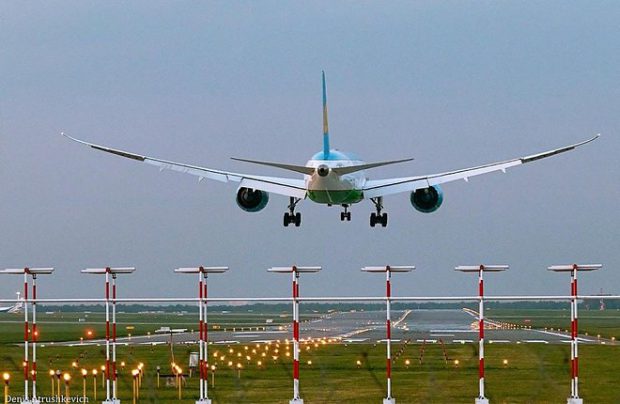Shakhriyor Abdubakiev
Image source: www.rusaviainsider.com
Uzbekistan’s airline industry has been widely criticized for its high prices and poor service. This results from the long-continued market monopoly of the Uzbekistan Airways company, which is a state-owned enterprise established in 1992. But the situation has been changing recently, and new companies such as Qanot Sharq airlines has entered the market. This means that issues related to the enforcement of competition law in airways services should be reconsidered again. In this regard, the blog post addresses the question of to what extent competition law should be enforced in the civil aviation service market.
1. Regulation of the aviation market in Uzbekistan
The Law “On Competition” was adopted in 2012 and consists of 7 chapters and 40 articles. There is also separate law to regulate natural monopolies -Law “On Natural Monopolies” adopted in 1997.
In regards to the aviation service, based on the Presidential Resolution “On measures to radically improve the civil aviation of the Republic of Uzbekistan,” in 2018, “Uzbekistan Airways” company was transformed into a Joint Stock Company. In addition, 14 state unitary enterprises of “Uzbekistan Airways” have been transformed into limited liability companies, and Uzbekistan Airports has been established.
It should be noted that the “Uzbekistan Airports” company with its 14 airports in the countries is recognized as a natural monopoly and included in the special state register. However, Uzbekistan Airways is not a natural monopoly but is considered a dominant company.
Uzbekistan Airways’s monopoly is a subject of a hot debate in the country as it is the only company operating regional and international flights in Uzbekistan. Being a constant monopoly has caused inefficiency in the market. This problem was also mentioned at a video conference meeting of the Senate Committee on Budget and Economic Reforms in October 2020. Notably, the meeting participants discussed the implementation of the Competition Law over Uzbekistan Airways and Uzbekistan Airports, Uzbekistan Railways, and Uzmetkombinat. Furthermore, meeting participants noted that airports are not adequately equipped with modern specialized equipment leading to low quality of service and technical maintenance. As a result, the attractiveness of airports as a business partner has been declining.
In the last decade since 2010, the number of flights of the company has increased only by 15%. The small number of aircrafts limits the ability to develop new routes, increase the number of flights, and increase the company’s efficiency. At the same time, the complex system of selection of flight classes harms consumers’ awareness of the important conditions of the purchased services. In addition, the development of cargo transportation in the system of JSC “Uzbekistan Airways” is not considered a source of additional income. The share of cargo services in the total volume of services is 0.03%, which is much lower than the 35% global standard for national airlines, indicating underutilization of freight capacity.
It should be noted, that the abovementioned issues have been openly admitted by Uzbekistan Airways as well.
3. New players in the aviation market
Competition in air transportation market is improving year by year in Uzbekistan. We can observe new market entrants namely Qanot Sharq (2021), Humo Air (2020),Air Marakanda (2020), and Silk Avia (2021). Indeed, this helps to increase passengers’ choice and promote price competition among airline companies resulting in lower prices and quality improvement.
4. Problems in promoting competition in aviation services
Qanot Sharq was registered in 1998 and specialized in cargo and passenger transportation. The company used to rent MAK II-76 aircraft from Uzbekistan Airways and has become the first private airline in Uzbekistan to operate charter flights, carrying more than 150,000 passengers until now. After transferring all II-76 aircrafts to the Ministry of Defense of Uzbekistan, the exploitation certificate of “Qanot Sharq” was suspended. Hereafter, Qanot Sharq decided to establish a regional airline in Uzbekistan in August 2019 but faced various barriers.
A former chairman of the Antimonopoly Committee Mr. Sharipov has spoken about problems. He said that the reason behind Qanot Sharq airline’s troubles were the following issues:
Firstly, Uzbekistan airport refused to sign a contract justifying it by the fact that ticket prices had not yet been approved. However, Sharipov said that it is not necessary to wait for the approval of the new prices. Furthermore, parties could sign a contract at old prices without waiting for approval from the Ministry of Finance for new prices.
Secondly, as a dominant player in the market, Uzbekistan Airports had to help the newly established company Qanot Sharq by setting a lower price. But Uzbekistan Airports has not yet done so.
After the Antiomonopoly body’s intervention, the Deputy Minister of Transport Mr.Choriyev has also commented on the issue. He said that the Ministry was doing the best to create fair competitive conditions for local airlines.
As the positive end of the situation, on April 26 of 2021, Qanot Sharq Airlines has launched its first flight and landed at Tashkent Airport. The good news is that Qanot Sharq Airlines is offering its customers tickets 30% cheaper than Uzbekistan Airways tickets. The airline operates flights to Turkey, the UAE, Saudi Arabia, Russia, Kazakhstan, and other new destinations. Speaking at the reception of the first aircraft, Minister of Tourism and Sports Aziz Abdukhakimov said that “for many years, the so-called monopoly in the aviation market has come to the end, and a competitive aviation market has been formed in Uzbekistan.” Indeed, the promotion of competition in this field leads to lower prices and increased quality of services.
Conclusion
This blog post identified challenges for the entry of new airlines in the aviation market and the attitude of the state agencies to the problem. Since 2020, we have witnessed the entrance of many private airlines into the market ending the monopoly of Uzbekistan Airways. In fact, the successful liberalization of civil aviation services in Uzbekistan depends on a healthy competition environment and the effective enforcement of competition law.
Cite as: Shakhriyor Abdubakiev, “Does competition law work in civil aviation services in Uzbekistan?”, Uzbekistan Law Blog, 10.05.2022.

Leave a Reply